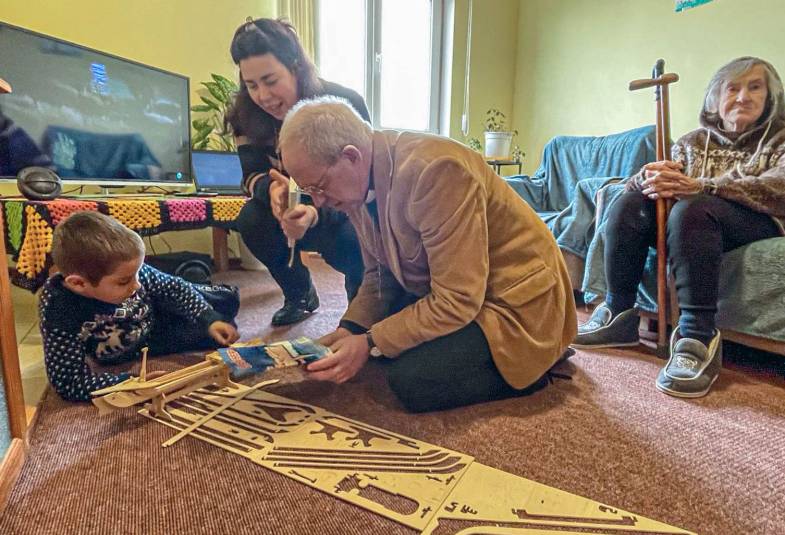09/02/2024

The Archbishop of Canterbury spoke of the need for long-term support for the people of Ukraine as he saw first-hand the physical and psychological toll of war almost two years after the full-scale invasion.
Visiting a shelter and support centre for people impacted by the war and meeting some of the country’s first military chaplains, he heard how needs are shifting from dealing with the initial crisis to providing long term support.
During a visit to the Heritage Ukraine crisis centre and shelter in Odesa, southern Ukraine, Archbishop Justin spent time with people who were left homeless, had lost loved ones or were themselves injured in Russian drone and missile strikes.
Following the full-scale Russian invasion of Ukraine in February 2022, Heritage - originally a charity helping orphaned children - transformed itself into a wider humanitarian aid and crisis operation, partnering with Christian Aid.
“At 5am on the 24th of February, 2022, when the bombing started, our lives changed radically,” Heritage’s director Slavik Puzanov told Archbishop Justin.
“In the first days of the war we would go to the railway stations and feed those who were fleeing other regions of the south, close to the front line.
“Since the full-scale invasion began, we left aside much of our other work as a charity and began to focus mostly on responding to pain, trauma and suffering.”
Iryna Dobrohorska, Christian Aid’s Ukraine Response Country Director, said there is a need to continue to support people with ongoing needs and “be there for them”.
“I think we are all in agreement that the war is not ending any time soon and the needs are dire,” she said.
“Our mission as Christian Aid is to support our partners, to support our people. For me as a Ukrainian it is a big honour to help the people of Ukraine, the people who suffered, I also underwent evacuation.
“And we are very grateful that there is still attention, that there is still interest in the most challenging time for our country”.
Among those Archbishop Justin met at the shelter was 73-year-old Luba who told him how her home was destroyed and her daughter killed in a Russian attack. Another woman, Tania, explained how her husband lost a leg in a drone attack as they were driving.
Father and son Slava and Andrei recounted how they had been unloading humanitarian aid to a community close to the front line when they came under fire in a drone-directed shelling attack. Andrei, 16, was injured in the leg and is recovering.
As Archbishop Justin led the Heritage Ukraine team in prayer at the end of the visit, the room was filled with the sound of sirens blaring out from on app on people’s mobile phones, warning of an air alert in the Odesa region.
He also heard firsthand about physical and psychological toll of war on the large numbers of people in Ukraine – and the battlefield itself - when he visited a Christian-run rehabilitation centre for soldiers at Bila Tserkeva near the capital Kyiv.
And he spent time with the newly established Ukrainian Battalion of Military Chaplains, made both of full-time chaplains and volunteer chaplains who are serving soldiers.
They recounted their experiences serving with those in the front lines and the scale of need to support those with not only physical but psychological scars.
When he asked them what they would do when the war ends, one replied: “It is important to know that when the war ends the military chaplains will have more work than ever.”
Speaking at the end of his five-day visit to Ukraine, Archbishop Justin said: “Although in some ways much looks the same as when I last visited just over a year ago, there have been some very significant shifts.
“One thing that people have spoken of everywhere we went is the toll this war is beginning to take on the people of Ukraine in PTSD and other mental health conditions.
“We’re only just beginning to grasp the likely scale of it – and how long-lasting the effects may be.
“While it was wonderful to see people in Britain rallying with support and hospitality for Ukrainians in the first phase of this war, we must now recognise that we need to be in this for the long haul, that’s one of the messages I will take away with me.
“The whole pattern of life and support is changing from immediate crisis to long-term help.
“This is not likely to stop soon.”